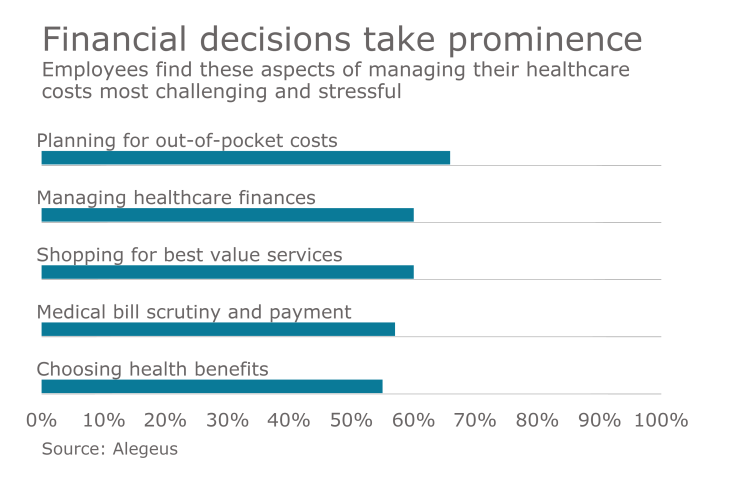Employees are far better at buying a range of popular consumer goods or services than they are purchasing medical services, according to Alegeus’ 2017 Healthcare Consumerism Index.
The study suggests that employees are “becoming more aware of costs and value for their healthcare dollars, but their spending behavior hasn’t necessarily caught up,” says Jen Irwin, head of marketing at Alegeus, whose healthcare engagement platform seeks to optimize healthcare spending and maximize savings.
Published annually since 2014, the 2017 index was based on a survey of more than 1,400 U.S. healthcare consumers, 76% of whom are enrolled in an employer plan. The results compared respondents’ healthcare purchase decisions with their shopping behaviors for other common goods and services, including autos, cell phones, retirement savings accounts and higher education.

The results show that “Consumers are more thoughtful about many other purchases and savings decisions than they are about their healthcare,” explains Irwin. Putting it another way, she says there’s still an overall lack of engagement to fulfill what she terms “the true vision of consumer-directed healthcare.”
There’s a simple explanation for the discrepancy. “Americans in many situations can get good information on cost and quality for many consumer goods,” explains Mark Fendrick, M.D., co-founder and director of the University of Michigan Center for Value-Based Insurance Design. “We can’t do that for healthcare now. It’s really hard to get the pricing information and almost impossible to find quality information.”
Despite the unflattering comparisons to other types of consumer spending, the Alegeus study spotlights an encouraging development: Engagement levels have risen steadily in terms of healthcare spending. More than half of consumers (55%) say they elicit the price of a medical service prior to receiving it; 60% research physician and facility quality ratings, and 64% say they understand their cost obligations under their insurance coverage. All three measures are up significantly from prior years.
Healthcare consumerism is shaping the strategic conversations that brokers and advisers are having with their employer clients, who Irwin notes are “under tremendous pressure to control their healthcare spending.” That impetus, along with rising awareness of healthcare spending on the part of employees, she says, “is driving interest in consumer-directed health plans (CDHPs) as a means to that end.”





